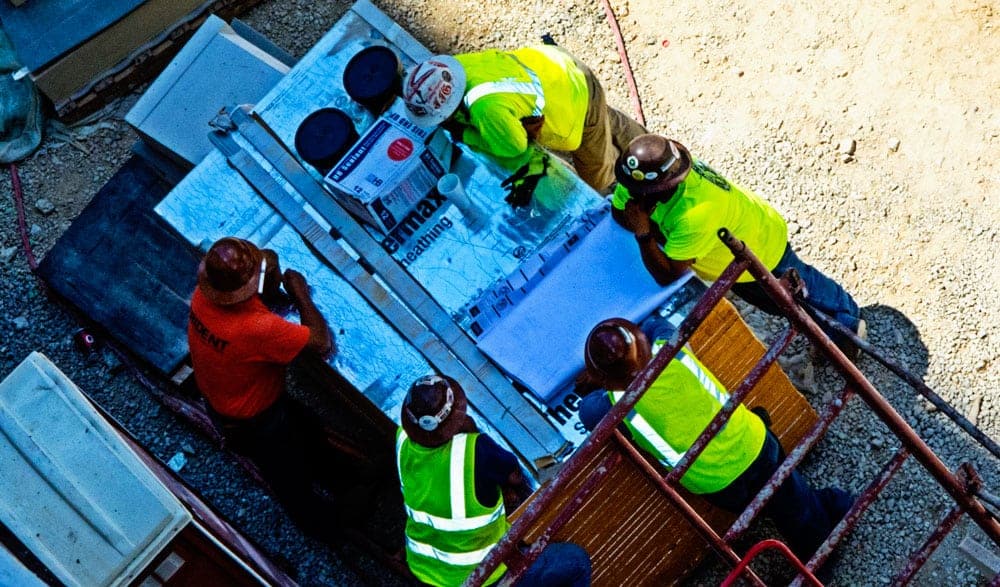Construction is complex business. It takes dozens, often hundreds, of people to build a commercial structure. That equals a lot of room for error.

According to a recent FMI survey of 600 construction leaders*, poor communication and poor project data account for 48 percent of all rework on U.S. construction projects, totaling $31.3 billion per year in avoidable construction costs.
Software platforms such as Procore, Cosential, and Viewpoint are helping the industry make strides in real-time information collection, knowledge management, and historical data capture, but poor communication presents an entirely different challenge, a human one.
Everyone in the industry comes from a different background and brings a unique perspective, training, experience, and style of delivering and receiving messages. Being mindful of that and more intentional when communicating can make a big impact.
Here are a few communication best practices that universally apply to all facets of life.
Focus on the one thing.
Consider the goal of your communication, whether it’s a meeting, a phone call, a presentation, or just an email. What is the one thing that you need the other party to know? Identify that and make that the focus of your message. Start with it, end with it, and follow up on it.
Cut to the chase.
Know your audience and consider what’s on their mind. Construction and development move fast. Be direct and clear in communicating your need, and the action required on the other person’s part. Also, consider what is the most efficient means of communication. A quick, impromptu phone call might accomplish the same thing as a meeting.
Keep it simple.
It’s awesome that you know every term in the construction dictionary, but that doesn’t mean it’s a good idea to use them. Again, consider your audience. If you are speaking with engineers or technical trades, then use the most specific terms you know. If speaking to a more general audience, avoid technical terms, phrase your key message in a way that is more broadly understood.
Be specific.
Instead of telling your owner that you will need to cut off power to a portion of the site sometime in October, tell them you will be cutting power off to buildings A, B and C on October 8th. This applies to communicating with colleagues as well. Don’t ask them to “take care of the paperwork.” This assumes they share your sense of urgency. Instead say, “please have the paperwork completed and on my desk by 5 p.m.” This is good management 101.
Be inclusive.
Anyone with a stake in the project should have a seat at the table. Just because the individual seated across the conference room from you doesn’t speak up during the project meeting, doesn’t mean he or she doesn’t have a valuable role in the outcome of your project. Engage everyone because more input provides more knowledge, and more knowledge builds better projects.
Follow up.
Don’t assume your message was heard and understood as you intended. At the end of a meeting or after you have sent an email, follow up with the other party to ensure your message was received as it was intended. You can do this by reiterating your key message, asking questions, or sharing detailed minutes or notes from your discussion.
Be responsive.
Unresponsiveness often conveys disrespect or lack of concern for others’ needs. Responding is always productive. When in doubt, a good fall back is, “I don’t know, but I’ll find the answer.”
Be honest.
This may be the last item on this list, but it’s the number one most important practice in effective communication. If you want to be heard, you must be worth listening to. If you are not trustworthy and accountable, you will lose your audience. Deliver both good and bad news as soon as you get it. Remember, the earlier you discuss an issue, the faster the team can resolve it.
While communications may be a significant problem for the construction industry, it is also one that is easy to overcome through consistent and diligent efforts to improve. Collaboration and good communication result in not only more successful construction projects, but also enjoyable construction experiences.
Learn more about how EMJ approaches client relationships and construction projects at EMJCorp.com.

* In April 2018, FMI Corporation partnered with PlanGrid to survey nearly 600 construction leaders and decision makers to discover how teams spend their time while on a job site, challenges associated with poor data management practices and miscommunication, and their technology investments. Read more about the study on PlanGrid.com.

Dottie McCallen has more than 16 years of experience in strategic communications, public relations, and content marketing. As EMJ Communications Manager, Dottie directs the internal and external communications for the company and provides executive counsel on organizational and operational communications.
